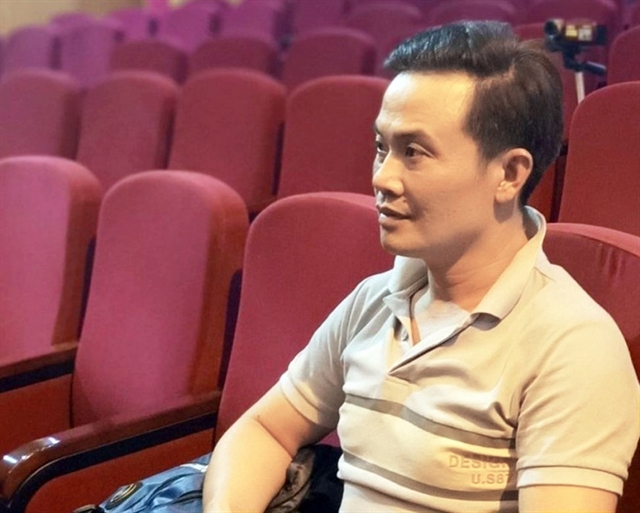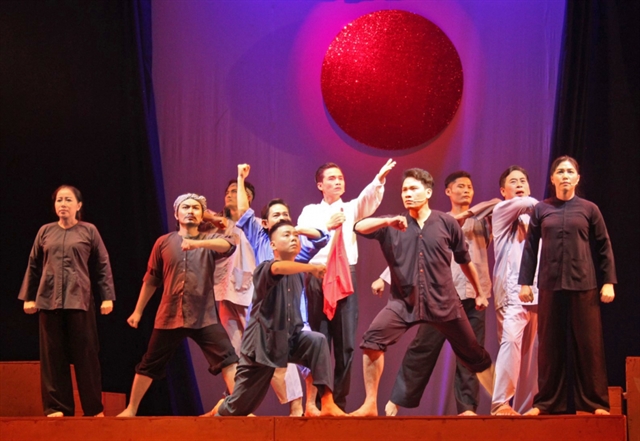Weather:
- Ha Noi 33oC
- Da Nang 30oC
- Ho Chi Minh 33oC

Playwright Phạm Văn Đằng was honoured for many plays performed at the Trần Hữu Trang Talented Cải Lương Performers Contest in 2022. His works have been staged at various cải lương (reformed drama) contests and theatres with praises from actors, audiences and art critics for his relentless efforts in script writing over the past nearly 20 years. Ninh Lộc talks with him about his passion
Inner Sanctum: How did you become a cải lương scriptwriter?
Actually, I always wanted to be a cải lương artist. After graduating from high school, I applied to study English at the HCM City University of Social Sciences and Humanities, and traditional theatre and drama at the City's College of Theatre and Cinematography. Despite my hard work, I failed both and switched to study Russia-English translation.
The dream of being an artist was abandoned for two years until I met several theatre and drama students who came to my school to perform. They awoke my dream. At the same time, my friend Đồng Thanh Phong encouraged me to take the university exam one more time. I failed again, but because of loving it so much, I asked to be a guest student.
I quit the bilingual class to focus on being an artist. But after two years, I found that I had no performing talent. (In this field) passion was not enough. I quit again and spent time to learn and took part in another university exam. This time, I became a student of the Hồng Bàng International University, learning Japanese.
But it was my destiny, so I couldn't run away from cải lương, and Phong asked me to write a script of nostalgic tunes for HCM City Television (HTV).
During my two years as a guest student, I had to write short scripts as exercises, and most of my works met teachers' standards. I also helped classmates in their works, which also received teachers' praise.
I remember that it was 2005, I received a call from Võ Tử Uyên, an editor at HTV, commissioning me to write a song about Ninh Thuận Province's dragon fruit. So, I composed Dragon Fruit Season, which was performed by artist Quốc Kiệt (now director of Trần Hữu Trang Cải Lương Theatre) and Meritorious Artist Thy Trang. I was delighted.
Since then, I have continuously received offers to work with various local television and radio stations.
Inner Sanctum: It seems like it was not easy for you to become a cải lương scriptwriter and music composer?
No, it was a tough job. In 2007, Bình Minh Film Studio asked me to write the drama script Giọt Máu Chung Tình (Blood of Love), my first work of this kind.
The plot was an Indian story, so I had to learn and read many books about India. It took me much time to complete the script, but it was immediately approved to shoot. Performing my work were talented artists such as Phượng Loan, Hữu Quốc, Trọng Phúc and Lê Hồng Thắm.
In 2008, Cần Thơ Province's Tây Đô TV Studio wanted a play for Tết (Lunar New Year). I was nominated, and I wrote Mùa Xuân Trong Mắt Em (Spring in Your Eyes). The late director Hữu Lộc staged and praised my work, saying “You write pretty well, try harder!”
Then, I had an opportunity to take part and work with famed composer and consultant Hoàng Song Việt in a programme entitled Harmony of the Land of Nine Dragons for VTV Cần Thơ.
The encouragement and guidance of a veteran director and composer helped me improve a lot.

Inner Sanctum: What was your turning point that made you really confident to be a cải lương scriptwriter?
It was a great opportunity for me to work with composer Việt in adapting classic plays such as Đường Đua Trong Bóng Tối (Race in the Dark) by Nguyễn Đăng Chương and Thầy Ba Đợi (Music Master Ba Đợi) by Nguyễn Thế Kỷ into cải lương.
In 2020, many of my scripts that I wrote and adapted were shot and staged. Among them were Nguyễn Hữu Cảnh, Lê Công Kỳ Án (Lê Công's Extraordinary Case), Đất Thiêng (Holy Land) and Chuyện Của Dung (Dung's Story).
Closely following every step of the professional staging processes while receiving advice from experienced directors, I learnt so many things and felt that my ability improved. I was much more confident.
Inner Sanctum: You have completed a vast amount of work over the last two years. Working in such high intensity, are you afraid of repeating yourself?
I have a habit of forgetting everything about a work, right after it is done. I think no more about previous work, so I don't worry about repetition.
However, the recent cải lương performances were mainly about historical figures who were quite new to today's audience. They were dramatic stories but somewhat lacked romantic details because they focused too much on historical events.
I received feedback and comments, and understood I had to strengthen my writing. I am more and more interested in the historical perspectives, even though it is very difficult and requires a lot of time and effort.
Lê Công Kỳ Án, for example, was written in two years and edited eight times before a complete work for staging was ready.
Inner Sanctum: Do you have any advice for young cải lương scriptwriters?
There are many composers of nostalgic tunes and many of them are really active. However, it is not easy to become a professional cải lương scriptwriter.
The stage for cải lương in both television and theatre has narrowed remarkably. Demands for scripts have reduced, so studios and theatres give priority to familiar authors. Therefore, most current composers are working because cải lương is their passion, but it is only considered extra work.
I hope that they can maintain their passion, and are lucky to have the chance to learn and develop well. It is the road that I went through. VNS


